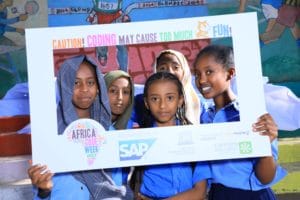
Cracking the gender inequality code
From the time of ACW’s launch in 2015, SAP, UNESCO and key global partners such as the Association for the Development of Education in Africa (ADEA) and Irish Aid, have been on a mission to introduce coding to youth and teachers, one community at a time. But with only 28% of women pursuing Science, Technology, Engineering and Mathematics (STEM) careers, Africa is well below the global average[i]. Year on year, ACW ambitiously aims to increase the participation of women and girls in this field. During the 2021 edition, more than 48% of the participants were girls, while a further 7,848 were young people with special needs. Olajide Ademola Ajayi, ACW Global Coordinator at SAP, says, “In today’s turbulent post-pandemic digital boom, we need to ensure that no one gets left behind.”
Adding to this, Dr Tawfik Jelassi, Assistant Director-General for Communication and Information at UNESCO, says, “Noting the extent to which digital skills are increasingly needed to understand and participate in today’s knowledge societies, it is particularly important that we address the gender disparity in STEM careers, especially as these are often described as the jobs of the future, driving innovation, social wellbeing, inclusive growth and sustainable development.”
To further inspire and prepare girls for tomorrow’s workplace, ACW recently hosted the fourth annual Women Empowerment Program (WEP), a unique Continuing Professional Development (CPD) program that equips African female educators with the competencies and knowledge they need to successfully teach. The aim of the Program is to close the digital gender gap and help ensure that everyone plays a role in shaping Africa’s future in the Fourth Industrial Revolution.
Teaching the teachers
In addition to the youth trained, the ACW program also upskilled +20,000 teachers during 2021 via its Train-the-Trainer (TTT) sessions. These sessions are a multiplier and enabler for digital know-how to become a core pillar of basic education in each participating country. “Africa has an abundance of potential, but the skills gap in this area is holding us back. With Africa’s rising youth unemployment, education is the key to creating a talent pool ready to take on 21st-century jobs and will ultimately help leapfrog the continent forward. It is Africa’s time to shine,” says ADEA Executive Secretary and ACW Patron, Albert Nsengiyumva.
Morocco leads in learning
For the fifth year in a row, Morocco successfully empowered the highest number of youths with 1,5 million gaining coding capabilities – a 9% increase from the previous year! Additionally, more than half of the teachers who received training, 11,000, came from Morocco. In fact, 4% of the entire Moroccan population participated in ACW. Ilham Laaziz, Director of the GENIE program at the Moroccan Ministry of Education and Vocational Training shares, “When ACW was first launched in 2015, only 20 teachers were trained live by SAP volunteers, yet more than seven million Moroccan youth were introduced to coding over the six editions of the program. We are thrilled that the 2021 edition was such a success, not only for Morocco but for the entire continent! ACW is a powerful platform to propel teachers and students into the digital century.”
Saving society with coding
A highlight of the 2021 edition was the second annual AfriCAN Code Challenge – a pan-African coding competition where young people are tasked with coding a game using the Scratch programming language to help address societal issues. This year, participants were asked how they would save the world with their superpowers, and the winning superheroes were Devansh and Darshika from Mauritius with their Super Recyclers game.
The competition was launched in 2020 in partnership with SAP, UNESCO, Irish Aid, ADEA and Jokkolabs and has since become an annual celebration of youth and innovation in Africa.
“It is only through the power of partnerships that we can help unlock the digital potential of millions more young Africans and empower them to become the leaders of tomorrow’s digital economies,” concludes Irish Minister for Overseas Development Aid and Diaspora, Colm Brophy.
For further information or to find out how to get involved in this year’s Africa Code Week initiative, visit https://africacodeweek.org.
[i] https://en.unesco.org/news/international-day-women-and-girls-science-addressing-and-transforming-gender-gap
About SAP
SAP’s strategy is to help every business run as an intelligent enterprise. As a market leader in enterprise application software, we help companies of all sizes and in all industries run at their best: 77% of the world’s transaction revenue touches an SAP® system. Our machine learning, Internet of Things (IoT), and advanced analytics technologies help turn customers’ businesses into intelligent enterprises. SAP helps give people and organizations deep business insight and fosters collaboration that helps them stay ahead of their competition. We simplify technology for companies so they can consume our software the way they want – without disruption. Our end-to-end suite of applications and services enables business and public customers across 25 industries globally to operate profitably, adapt continuously, and make a difference. With a global network of customers, partners, employees, and thought leaders, SAP helps the world run better and improve people’s lives. For more information, visit www.sap.com.
